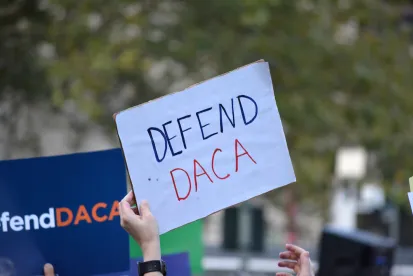Efforts to pass “Dreamers” bills that would provide a pathway to citizenship for Deferred Action for Childhood Arrivals (DACA) recipients have remained stagnant. In an effort to stabilize the DACA program, absent congressional action, the Department of Homeland Security (DHS) has published a proposed federal regulation announcing its intent to codify the DACA program.
The proposed rule keeps DACA eligibility guidelines consistent with the June 15, 2012, DACA memorandum issued by former Secretary of Homeland Security Napolitano during the Obama Administration, but provides some clarification:
-
The optional employment authorization requires a separate application. Accordingly, although the total fees will remain at $495, requestors can pay $85 when requesting DACA (Form I-821D) and can request a work permit, which would cost an additional $410 (Form I-765). The request for a work permit can be submitted at the same time or subsequently. Regardless of when employment authorization is requested, the grant period for the work permit will not exceed the grant period given by DACA.
-
DACA requestors must establish an economic need to be eligible for employment authorization by filling out Form I-765WS along with Form I-765.
-
DACA recipients are lawfully present in the United States under the Social Security regulations.
-
DACA recipients do not accrue unlawful presence.
-
DACA recipients are eligible to petition for advance parole for urgent humanitarian or significant public benefit reasons.
-
DACA recipients returning with advance parole can satisfy the “inspected and admitted or paroled” requirement for adjustment of status purposes under INA § 245(a).
-
Information about DACA recipients and their family members included in DACA requests will not be shared affirmatively with Immigration and Customs Enforcement, U.S. Customs and Border Protection or law enforcement agencies for immigration enforcement-related purposes, unless an exception applies, including for assistance in the consideration of DACA, to identify or prevent fraudulent claims, for national security purposes, or for the investigation or prosecution of a criminal offense.
-
USCIS may terminate a person’s DACA at any time with or without issuance of a Notice of Intent to Terminate when a person does not meet the threshold criteria, commits disqualifying crimes, or presents national security, public safety concerns, or other adverse factors.
-
USCIS will automatically terminate DACA when a Notice to Appear (NTA) is filed with the immigration court (unless USCIS issues the NTA in relation to an asylum application) or a DACA recipient leaves the United States without advance parole.
-
A DACA termination automatically results in termination of the employment authorization document.
-
DACA itself does not confer any rights or entitlements to remain in or re-enter the United States. DHS may initiate any criminal or other enforcement action against a DACA recipient at any time.
The proposed rule seeks to clarify criminal-related bars for DACA eligibility. DHS is proposing to clarify the term “significant misdemeanor” by identifying specific misdemeanors that would be automatic bars to DACA eligibility. These would be offenses for which the individual was sentenced to time served in custody of more than 90 days. Having a felony or significant misdemeanor conviction are already automatic bars to DACA eligibility, but the proposed rule would expand this to expunged convictions. DHS is welcoming comments on whether to include a more detailed definitions of these offenses, including what constitutes “minor traffic offenses.” The public has until November 29, 2021, to submit comments about this rule.
Even after the proposed rule becomes final, the DACA program would continue to hinge on courts’ interpretations of the program. But absent a court order preventing DHS from continuing the DACA program, once the final rule is published, USCIS may begin to accept and adjudicate initial DACA requests from persons who never had DACA, along with DACA renewals.




 />i
/>i
